By now you’ve probably heard of the website HitPiece.com and their outrageous scheme to mint “NFTs” of virtually every song and album in existence. If you have not I suggest you read a pair of excellent articles by Kristin Robinson at Billboard Pro. Here and here.
“Founded by serial entrepreneur Rory Felton and investor Jeff Burningham, Hitpiece’s intent was to create NFTs of “every song,” according to the company’s pitch deck. Using Spotify’s API to gather information on artists of all sizes – from developing acts to Beatles members – HitPiece uploaded listings of NFTs from musicians it had never spoken to or partnered with, stating these non-fungible tokens were “available for auction” or “live” auctions. According to HitPiece’s FAQ section, the NFTs were said to operate on HitChain, a private Ethereum side chain which does not provide proof of work.”
If you are not even sure what an NFT is think of it as a sort of cryptocurrency like Bitcoin. But there is only one unique token. And this token can be associated with another digital asset, like a digital drawing, photograph, song or tweet. The issue is anyone can do this. Whether they have the rights to the associated file or piece of intellectual property. And that’s exactly where the problem starts.
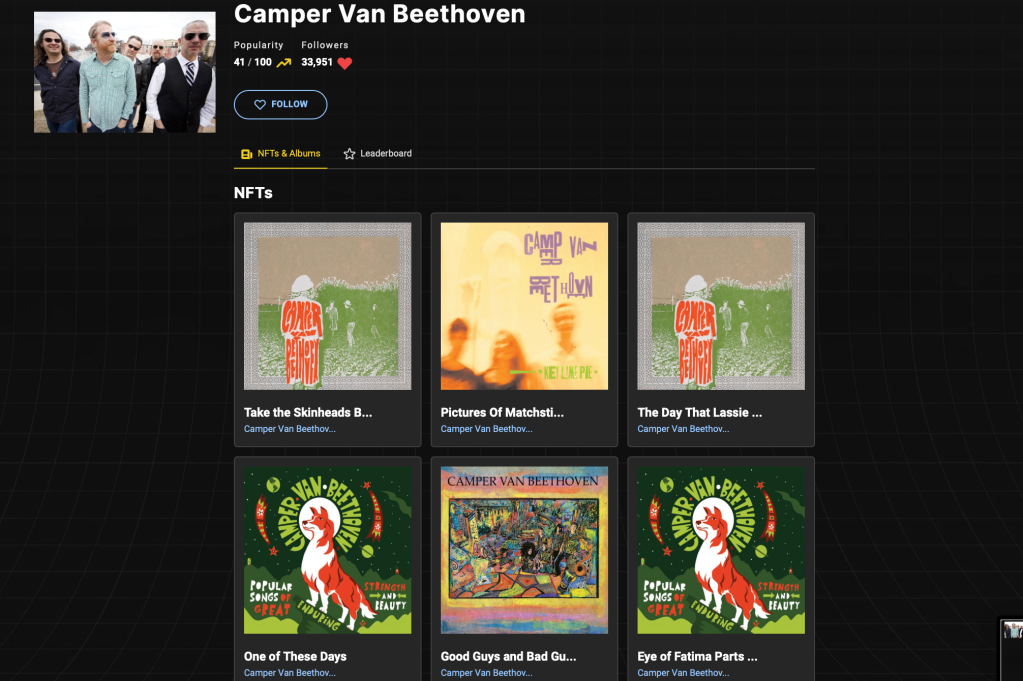
On Feb 1st my twitter feed began to fill with outraged artists reporting that a website HitPiece.com was offering “NFTs” of their songs. I went and checked and sure enough the website was offering NFTs of virtually every one of my songs and recordings. Now I hadn’t authorized anyone to make NFTs of my songs and recordings and offer them to the public. Nor had I licensed anyone to use my album artwork, trademark, name, likeness or image to use on any products and especially not NFTs. I checked with my former labels on the outside chance they had licensed something but as I suspected they had not. And indeed even recordings which I exclusively hold the rights were on HitPiece.com.

I dug around on the site to see if I could figure out what was going on. Here I found the above paragraph. “Each HitPiece NFT is a One for One NFT for each unique song sound recording.” That sounds like they had minted or intended to mint a NFT of each one of my songs/sound recordings. Without any sort of authorization.
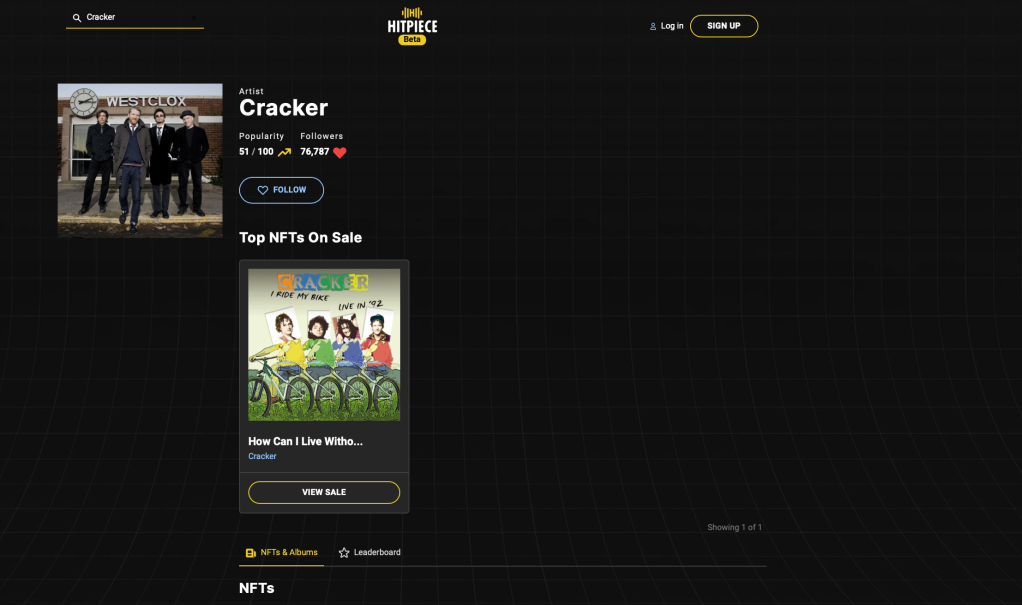
I even found a live auction of one of our tracks. Curiously it is an unreleased/unlicensed live radio broadcast that recently showed up on Spotify. From this I could confirm what I suspected: HitPiece was “scraping” Spotify to auto generate NFTs for every song on the platform. In addition they were sucking in promo photos and album art.
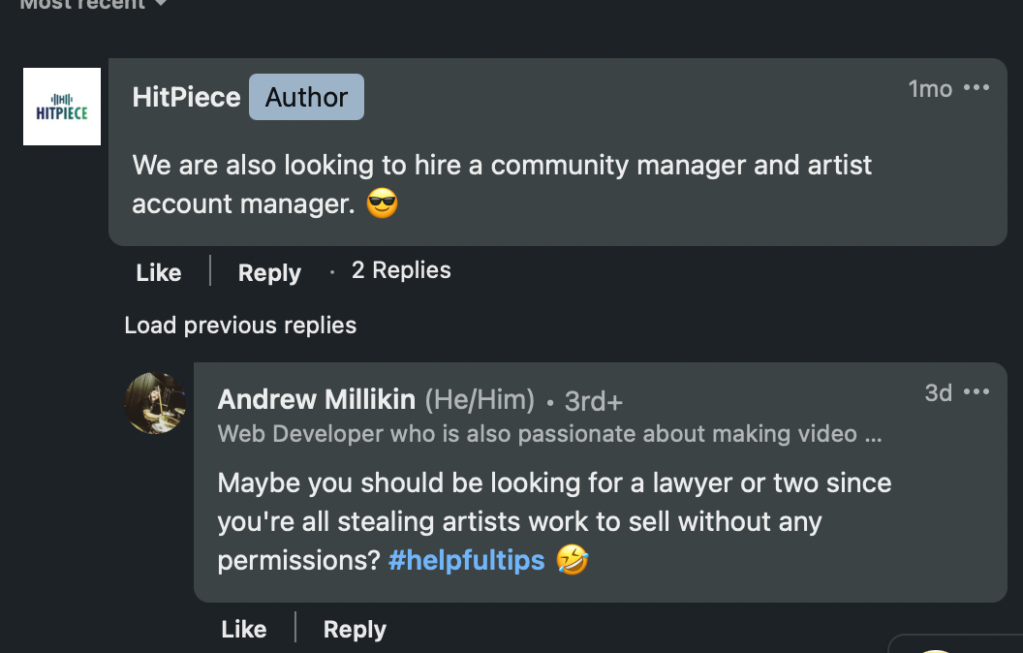
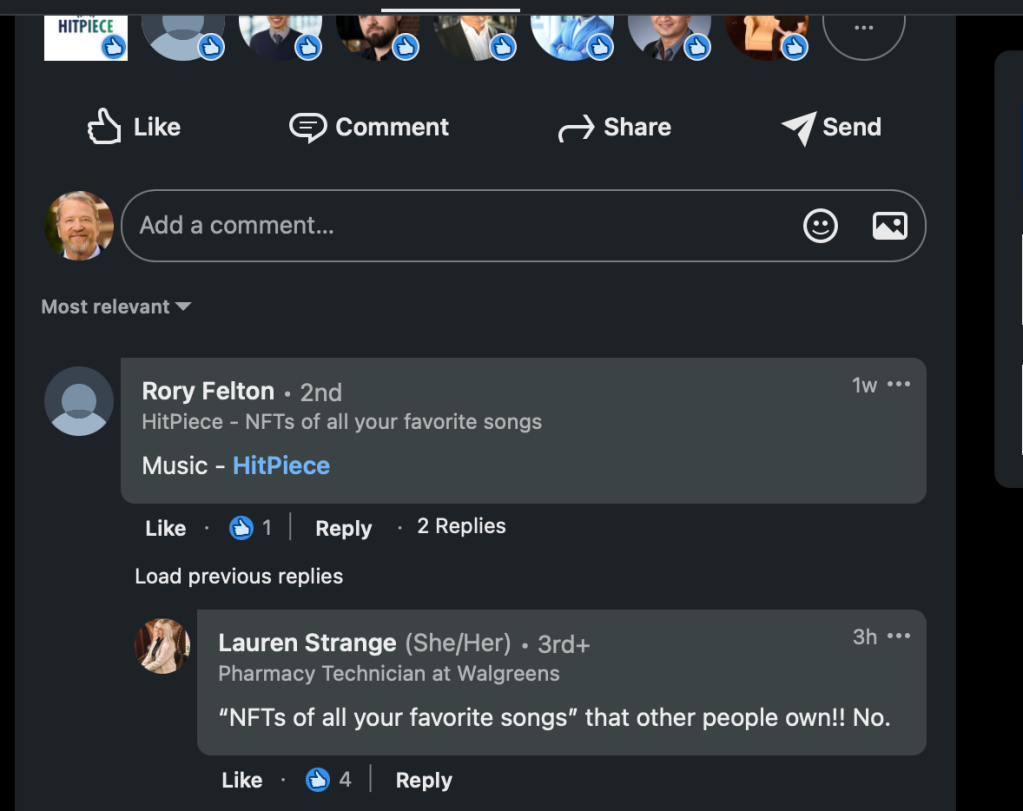
It appeared as if there were hundreds if not thousands of similarly situated artists, as when I went back on social media every artist I follow was posting screenshots of HitPiece NFTs. All of the artists noted (often in profane terms) that they had not authorized HitPiece to offer NFTs to the public. It became a true twitter shitstorm. By the end even civilians on LinkedIn were getting into the act (see above.)
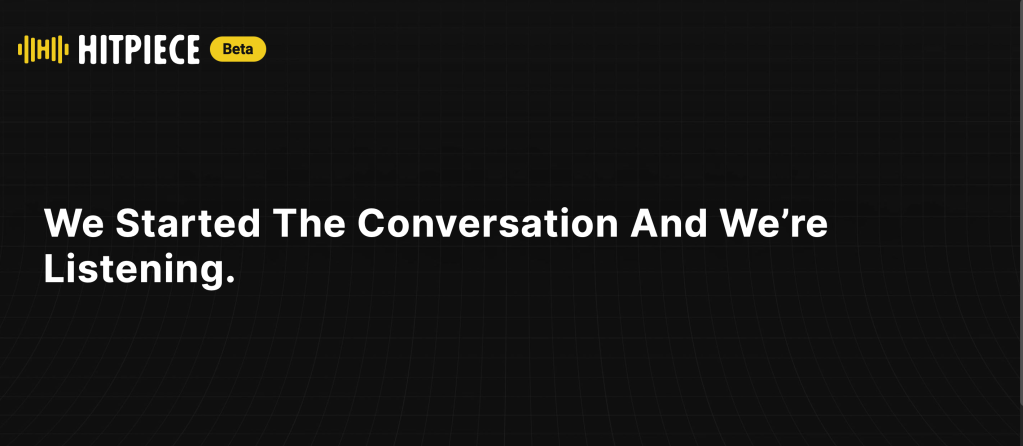
Late that evening the operators of the website, took the website down, or it crashed under the crush of traffic. They later put the website back up with the above note (minus the NFT offerings).
By Friday numerous artists had sent “cease and desist” letters, others were promising lawsuits and even the RIAA announced they were taking action on behalf of their artists. The RIAA letter asks HitPiece to preserve all relevant emails and documents, which is usually a prelude to legal action. And indeed the letter makes reference to a number of violations.
“…copyright infringement (17 U.S.C. § 101), trademark infringement (15 U.S.C. § 1114), federal unfair competition and false representation of affiliation (15 U.S.C. § 1125(a)), violations of state and common law rights of publicity, and unfair competition under applicable state law…”
The RIAA also asked HitPiece to permanently close their website and business.
So case closed let’s move on ,right? The big companies with the big lawyers are on the case. No one will ever try this again. Right?
I wouldn’t be so sure. Remember YouTube started out as (and still is) a massive infringer of copyrights. Sure they pay some royalties on some tracks, but at a rate 1/8 to 1/20th that of Apple Music. And now It’s just too big to do anything about it. Do we want the same thing to happen with something like NFTs? The audacity of HitPiece scam is that by promising to mint an NFT of every song they intended to corner the entire market for song NFTs. What if it had worked? We’d have no leverage. We’d be coming hat in hand to them begging for a few pennies like we do with YouTube.
No, the best thing to do is to make an example out of these folks. Bankrupt them. These are not poor hackers living in their parents’ basements. Two are former major label record executives and the other two are wealthy private equity executives (here and here). These folks have A LOT to lose. We should make it so no one ever does business with these folks again. And the best way to do this is not by banding together through the usual copyright class action (although we can do that too), the best way to make their lives miserable is to bury them under a blizzard of individual complaints. Who knows maybe you’ll find a state prosecutor that wants to charge them with a crime. (doesn’t this seem like a criminal fraud?).
Although there is likely a copyright claim if you have registered your artwork, copyright infringement must be adjudicated in federal court. Similarly with Trademark infringement. And over the last two decades congress and the courts have made life pretty easy for anyone infringing copyright and trademark via the internet. The deck is stacked against us. What we really want to do is rely on laws that we can pursue easily in our own states. The RIAA letter helpfully suggests a number of tactics at the state level.
I’m not an attorney and I certainly don’t know the laws in all 50 states, this is just one musician talking about the tactics I intend to investigate and pursue:
Fraud. By any common definition of the term, what HitPiece did was conduct a fraud. The website clearly misleads the public. I didn’t offer my songs up as an NFT for sale. Yet my picture and name is right there. They “palmed off” something as a genuine product that was not. Legally is this fraud? It sure feels like it but I’m not an expert. I intend to complain in person at the local state district attorney’s office.
Rights of publicity. Many states either have a law that recognizes a kind of property right in my own persona. Companies can’t make products or provide a service with my name, likeness or image. If your state doesn’t explicitly provide a statute, it’s likely a state court has recognized a “common law” right. I intend to mention this at the local state district attorney’s office cause it’s a key element of how HitPiece executed their apparent fraud. I may file a separate civil claim against them.
Implied Endorsement. My state may also have a specific law that doesn’t allow others to imply that I endorse their product. Again this is something I will mention at the local state attorney’s office as it’s key to their scheme. I may also file a separate civil claim against them.
Unfair Competition/Deceptive Practices: Most states have these laws. What’s more deceptive and unfair than using my own copyrights,trademarks, name image and likeness to sell a product I didn’t endorse. The principals at HitPiece knew they didn’t have licenses with me. Two had deep experience in the music business managing intellectual property rights They knew what they were doing. Talk to your local state district attorney about this as well.
If hundreds of artists did something similar in dozens of states, we could really make these folks lmiserable.
Now that ‘s just my take as an artist.
Here are some similar suggestions from real attorneys…
More on this later. This is still developing.

Some “conversation”. We’ve created and are selling your music; let’s talk. If it wasn’t shut down so quickly this would indeed be a smash-and-grab situation. It’s comparable to the companies that grab rights for the advertising revenue on tracks on YouTube hoping the owners won’t notice. That scam is still running.